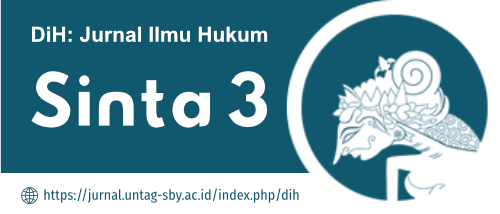Pertanggungjawaban Pidana Korporasi terhadap Hak Cipta
DOI:
https://doi.org/10.30996/dih.v10i20.361Abstract
Abstract. Not categorize a corporation as the subject of criminal law in the Copyright Act, the resulting corporation can not be prosecuted criminally liable. Corporations that commit crimes against copyright as if permission is granted impunity, namely freedom from punishment for his crimes in the form of piracy, reproduce and sell copyrighted works person. Though losses caused by corporate copyright offenders is enormous consequences for the country and for the owner or copyright holder than if the perpetrator is an individual. Accountability is delegated to the board of the corporation, be it director, manager, head of department, the operator, even though the employee has been going down during this proved unsuccessful raises deterrent effect. This research shows that in the case of copyright violations, the corporation must do the following may be prosecuted criminally managers with the maximum penalty for these crimes do not happen again in the future, along with the appropriate theory to apply. Also exposed to more forward thinking aspects of primum remedium if a violation has reached a disturbing level and cause ganggungan widely. It is recommended to take over the corporation who commits an offense if the implementation aspects of copyright primum remedium corporation went bankrupt, so that employees do not lose their jobs.
Key words: Corporate, Subjects of Criminal Law, Copyright.
Downloads
References
Abdul Wahab, Shalihin, 2002, Analisis Kebi-jakan Publik, Dari Formulasi Ke Imple-mentasi Kebijakan Negara, Bumi Aksara, Jakarta.
Agustino, Leo, 2006, Dasar-Dasar Kebijakan Publik, Alfabeta, Bandung.
Anderson, James E , 1979, Public Policy Making, Holt,Rinehart and Wistom, New York.
Balitbang Depdiknas RI, 2008, Peran orang tua dan guru dalam membangun lingku-ngan yang kondusif untuk pengembangan karakter peserta didik. Disertasi.
Bogdan, R.C dan Biklen, S.H, 1992. Quali-tative Research For Education: An Intro-duction To Theory And Methods. Boston Allyn And Bacon: Inc.
Creswell, John W, 2002, Research Design: Qualitative And Quantitative Approaches, Jakarta, KIK Press.
Dunn, William, 2003, Pengantar Analisis Kebijakan Publik, peNerjemah Samudra Wibowo, Dkk, Gajah Mada University Press.
Dye, Thomas R, 1995, Understanding Public Policy,New Jersey Prentice Hall.
Eulau, Heinz, and Kenned Prewitt, 1973, Labyrinths of Democracy, Indianapolis: Bobs Merrill.
Griddle, Marilee, 1980, Politics and Policy Implementation in the Third World, Prevention University Press Princeton New Jersey.
Guba E Dan Lincoln, 1981, Efectiffe Evalua-tion, San Fransisco, Jossey BassPublisher.
Harsubenowati,2006, Pendidikan Karakter Dan Pola Kepemimpinan Dalam Mening-katkan Kualitas Pendidikan, jurnal STISIP Muhammadiyah Madiun.
Hewlett, Michael, and Ramesh, 1995, Stu-dying Public Policy: Policy Cycles and Public Subsystem, Oxford University Press.
Hogwood, Brian,W, Dan Lewis A. Gunn, 1990, Policy Analysis For The Real World, Oxford: Oxford University Press.
Islamy, Irfan, 1991, Prinsip-prinsip Perumu-san Kebijakan Publik, Bumi Aksara, Jakar-ta.
Jones, Charles O, 1991, Pengantar Kebijakan Publik, Rajawali Press, Jakarta.
Kartono, Kartini, 1997, Patologi 2, Kenakalan Remaja, Jakarta, Rajawali Press.
Koesoema, A. Doni. 2007. Pendidikan Karakter. Jakarta: Grasindo.
Lickona, Thomas, 2000. “Talks About Cha-racter Educationâ€, wawancara oleh Early Chilhood Today, Pro Quest Education Journal, April, 2000, http://webcache. google user-content.com., diunduh, 20 April 2010.
Mazmanian, Daniel A. dan Sabatier, Paul A, 1983, Implementation and Public Policy, Scott, Foresmen & Company, calofornia.
Megawangi, Ratna, 2007, Pendidikan Karak-ter, Solusi Tepat Untuk Membangun Indo-nesia, Jakarta: Indonesia Haritage Founda-tion.
Melly Latifah, 2009. Dampak Pendidikan Holistik Pada Pembentukan Karakter Dan Kecerdasan Majemuk Anak Usia Sekolah, Jurnal Fakultas Ekologi Manusia Institut Pertanian Bogor, 32-40.ISSN,1907 – 6037.
Miles, M.B. Dan Huberman,A.M. Analisis Data Kualitatif, Alih Bahasa Rohidi. Tj.R. Jakarta, Penerbit Universitas Indonesia.
Moleong, L.J, 1996. Metodologi Penelitian, Bandung, PT Remaja Karya.
Oberlin, Silalahi, 1989, Beberapa aspek Kebi-jaksanaan Negara, Yogjakarta: Leberty.
Perda Nomor 13/2006 Kabupaten Pamekasan tentang “Sistem Penyelenggaraan Pendi-dikanâ€, Edisi 27 Desember 2006.
Santoso, Slamet Imam, 1988, Pembinaan Watak Tugas Utama Pendidikan, Jakarta: UI Press.
Soemarno Soedarsono, 2009. Karakter Mengantarkan Bangsa dari Gelab Menu-ju Terang. Jakarta: Kompas Gramedia.
Spradley, james P, 1980, Participant Ober-vation, New York: Holt Rinehart, and Winston.
Suharsono, 2006, Analisis Kebijakan Publik Konsep, Teori dan Aplikasi, Pustaka Pela-jar, Yogyakarta.
Suharto, Edi, 2006, Analisis Kebijakan Publik, Panduan Praktis Mengkaji Masalah dan Kebijakan Sosial, Alfabeta, Bandung.
Tomas K. Cook & Frank P.Scioli, 1975. Impact Analisys In Public Policy Researc.
Uyoh Sadulloh.1994. Pengantar Filsafat Pen-didikan. Bandung: P.T. Media Iptek.
Wibowo Samudra, Cs, 1994, Evaluasi Kebi-jakan Publik, PT Raja Grafindo Persada, Jakarta.
Winarno, Budi, 2004, Teori dan Proses Kebi-jakan Publik, Edisi/Cetakan Kedua, Media Pressindo, Jogjakarta.
Downloads
Published
Issue
Section
License
Authors who publish with DiH: Jurnal Ilmu Hukum agree to the following terms:
- Authors transfer the copyright and grant the journal right of first publication with the work simultaneously licensed under a CC BY-SA 4.0 that allows others to share the work with an acknowledgement of the work's authorship and initial publication in this journal.
- Authors are able to enter into separate, additional contractual arrangements for the non-exclusive distribution of the journal's published version of the work (e.g., post it to an institutional repository or publish it in a book), with an acknowledgement of its initial publication in this journal.
- Authors are permitted and encouraged to post their work online (e.g., in institutional repositories or on their website) prior to and during the submission process, as it can lead to productive exchanges, as well as earlier and greater citation of published work (See The Effect of Open Access)










